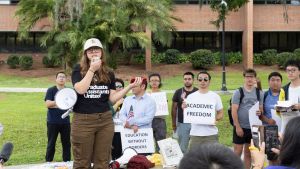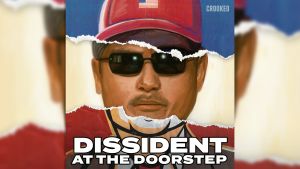
Praising a Dead Dictator: How US Officials’ Visits to Taiwan Wade into Complex Historical Debates
In August 2022, US Senator Marsha Blackburn travelled to Taiwan in what was the last of three visits by members of the US Congress during that month alone. The trip occurred soon after Nancy Pelosi had visited the island with a bipartisan delegation of other elected US officials in what was the first visit by a US Speaker of the House of Representatives in 25 years, since Newt Gingrich’s mission in 1997 (Timsit 2022).
Pelosi’s visit was originally scheduled for April (Bloomberg 2022) as a show of support at a time when Russia’s invasion of Ukraine had left many wondering whether Taiwan would be the next international flashpoint. However, that trip had to be called off because Pelosi was infected with Covid-19. As Pelosi was planning her visit to the island in early July, the Financial Times reported on her intentions (Sevastopulo and Hille 2022). At that point, public comments by US President Joe Biden suggested that he viewed the visit as inadvisable, given the potential for escalation by China in response (Desiderio and Ward 2022). For her part, Pelosi downplayed Biden’s comments as simply related to her personal security (Dawson 2022). For several weeks, international observers speculated about whether Pelosi would make the trip, with discussion centring on the possible consequences if she did.
When Pelosi finally arrived in Taiwan, China responded with a series of live-fire exercises that were closer to the island’s shores than those during the Third Taiwan Strait Crisis of 1995–96 (Lee and Wu 2022). The Chinese military also fired missiles over Taiwan for the first time to signal its capacity to launch a decapitating strike on Taipei and major metropolitan centres (Takahashi 2022). Chinese missiles also landed in Japan’s exclusive economic zone, which Japan’s Ministry of Defence viewed as deliberate (Kyodo News 2022). Both before and after Pelosi’s visit, Chinese warships were sighted around the disputed Senkaku/Diaoyutai Islands, suggesting China was also timing military displays aimed at Japan (Central News Agency 2022). Chinese ships were also spotted in the Yellow Sea and Bohai Sea, near South Korea (CGTN 2022).
We can speculate that, if Pelosi had not become infected with Covid-19, ensuring a different timing for her trip, or if international media had not reported on the trip before it took place, this scenario would have played out very differently. Since the Biden administration took power, it has been more common for US politicians to announce visits to Taiwan only once they have arrived, to minimise the window for China to react. In this case, international speculation about the possible consequences of a Pelosi visit became so heated, it arguably obligated the Chinese leadership to respond with a strong show of force, to avoid coming across as weak to both domestic and international audiences. This is a situation that is exacerbated by the twentieth National Congress of the Chinese Communist Party (CCP), which is scheduled to take place in mid October and which is expected to see Chinese President Xi Jinping securing an unprecedented third term.
We can only speculate about Pelosi’s motives. She reportedly decided to make the trip because of the view that sooner or later China would find a pretext to escalate tensions in the Taiwan Strait, so she might as well signal US support now (Abutaleb and Pager 2022). At the same time, many interpreted the trip as a move primarily related to US domestic politics. As she is expected to retire soon, Pelosi may have been hoping to secure a legacy as a liberal hawk on China. Or she may have been hoping to shore up the Democrats’ credentials as tough on China through signalling support for Taiwan ahead of US midterm elections. Regardless of her intentions, the trip did not mean much in terms of substantive gains for Taiwan. No arms deal or economic treaty came out of the visit, for example. Nevertheless, Pelosi’s journey was fraught with symbolism—significant stops included meetings with semiconductor executives and a visit to a former prison from the authoritarian era to meet with Tiananmen Square student leader and Uyghur dissident Wu’er Kaixi; the last of the Hong Kong Causeway Bay booksellers to remain free, Lam Wing-kee; and Taiwanese human rights nongovernmental organisation worker Lee Ming-che, who was arrested in China and detained for five years on charges of subversion of state power (Apple Daily 2022).
Blackburn Praises a Dead Dictator
Not long after Pelosi’s visit, a second US delegation, led by US Senator Ed Markey, touched down in Taiwan. This more closely conformed to the pattern established by other Biden administration visits, in that it was only announced shortly before it took place and was conducted in a relatively low-key manner—though even on this occasion China responded by announcing military drills (Hua and Wang 2022). Like Pelosi’s visit, the Markey delegation was bipartisan in nature. Later in the month, Taiwan also played host to Indiana Governor Eric J. Holcomb (Yeh 2022) and Arizona Governor Doug Ducey (Cheng 2022), both of whom likely had trade in mind. These received less attention than the visits by members of Congress.
In between Markey’s trip and those by the two governors came Senator Blackburn. Deviating from the pattern established by other Congress members, she arrived alone. Blackburn’s visit was marked by several incidents in which she veered off script, including referring to Taiwan as an ‘independent nation’ during a meeting with Taiwanese President Tsai Ing-wen (Hsu and Gau 2022). Most notably, however, she took a photo of herself in front of the Chiang Kai-shek memorial and posted it on her personal Twitter account. The accompanying tweet described the memorial as devoted to the ‘work’ of Chiang Kai-shek. Few domestic outlets in Taiwan reported on the fact that Blackburn had waded into the middle of an unsettled debate about Chiang’s legacy of which she was probably unaware.
Blackburn’s tweet proved ironic, especially as she had just vowed resistance to authoritarian leaders in a previous tweet. Tsai’s Democratic Progressive Party (DPP), after all, emerged from the decades-long democracy movement to resist the authoritarianism of Chiang’s Nationalist Party (Kuomintang, or KMT). The KMT ruled Taiwan for decades in what was then the world’s longest period of martial law. The founding figures of the DPP and many of its major politicians, including Tsai’s predecessor as DPP President of Taiwan, Chen Shui-bian, served years in jail—and even faced the threat of capital punishment—at the hands of the KMT. Major members of Tsai’s administration, such as Premier Su Tseng-chang and Control Yuan head Chen Chu, entered politics after a long history of activism against the dictatorship of Chiang Kai-shek and his successor and son, Chiang Ching-kuo.
Public verdicts on the Chiangs remain divided. Polling shows that Chiang Ching-kuo is remembered as the Taiwanese president who contributed the most to Taiwan, while Chiang Kai-shek is remembered as having contributed the least (Luo 2019). The Nationalists have framed Chiang Ching-kuo as a benevolent dictator who relinquished power to allow for Taiwanese democracy. In reality, the KMT was under extreme pressure to allow the transition to democracy in the face of an ‘extra-party’ (黨外) movement that aimed to form a political party outside its ranks. Many adherents of the KMT’s view of history still praise both Chiangs as anticommunist heroes who allowed for Taiwan’s current freedom from China, or as having provided the foundations for Taiwan’s economic prosperity. Nevertheless, it is important to bear in mind that this takes place in the changed political reality of the twenty-first century, when the KMT has now pivoted towards being a pro-China, pro-unification party.
The KMT fits the classic pattern of right-wing authoritarian dictatorships backed by the United States in the interests of anticommunism, with many of the individuals who came to Taiwan from the mainland with the KMT in 1948–49 constituting an elite political and economic ruling class during the authoritarian period. This ruling class could not have maintained power without US backing. However, with democratisation, this ruling class lost its privileges. As the KMT is not militarily capable of retaking China, the party has become amenable to facilitating the unification of Taiwan and China, even if it occurs under the auspices of the CCP. Arguably, this comes with the view that political unification could mean a restoration of elite privileges for the party.
The KMT has sometimes been understood as a settler-colonial regime. Though statistics are inexact and dated, according to Taiwan’s Ministry of the Interior, in 2002, 88 per cent of Taiwan’s majority Han population was descended from previous waves of Han migration, while about 10 per cent of the population was descended from those who came with the KMT (Hsu and Chen 2004). The descendants of Taiwan’s indigenous inhabitants are thought to constitute about 2 per cent of the population, according to the government (Gao 2015). Seventy years after the KMT’s withdrawal to Taiwan, the lines between these groups have become increasingly blurred.
For their part, US officials distrusted Chen Shui-bian—the first non-KMT president in Taiwanese history, in office from 2000 to 2008—as potentially throwing a wrench in US designs for regional stability in the Asia-Pacific, viewing him as an ideological provocateur irrationally bent on realising Taiwanese independence. Even if Tsai has now won the backing of the United States through adhering to a moderate status quo position, successive US administrations originally saw her in the same light, sabotaging her 2012 run for president with a phone call placed to the Financial Times from the White House expressing a lack of faith in her ability to stand up to China (Shih 2020).
Yet, a strange series of historical reversals has now resulted in the DPP aligning with the United States, which backed the KMT during the authoritarian era. And the KMT has now pivoted towards its former enemy, China. This is perhaps related to the fact that KMT political rule was always predicated on its backing by an external power.
Unwittingly Wading into Complex Historical Debates
Though Senator Blackburn was likely unaware of it, her trip and tweet occurred at a time of complex debate about what to do with the legacies of the authoritarian period, including the verdict on Chiang Kai-shek. There are statues of Chiang on school campuses and government sites across Taiwan. As many of those educated during the authoritarian era still view Chiang as a figure of veneration, removing these structures is controversial (Hioe 2015a). The biggest question is what should be done with the Chiang Kai-shek Memorial Hall, a hulking place in downtown Taipei that enshrines a 3.5-metre statue of Chiang. Proposals for the memorial as part of transitional justice efforts include turning the site into a museum about the authoritarian period or the new home for the legislature, as a structure more suitable for contemporary democratic values (Hioe 2022).
The verdict on this history is not settled and many members of the KMT retain positive views of Chiang. A sign of this is the fact that the KMT’s candidate for Taipei mayor in the local elections later this year—a position traditionally viewed as a stepping-stone to the presidency—is Chiang Wan-an, who claims to be the illegitimate great-grandson of Chiang Kai-shek (Krishankutty 2022). In the meantime, the DPP and KMT continue to contest the other’s view of history. Part of this is simply a reflection of the unsettled legacy of the authoritarian era, with the KMT downplaying incidents such as the ‘228 Massacre’, which, in February 1947, marked the start of the decades-long White Terror, and generally minimising the number of victims or suggesting that those targeted were primarily communist infiltrators or spies.
Opinion polls show the current generation of Taiwanese overwhelmingly identifies as Taiwanese and not Chinese (Feng 2022). Unlike their grandparents, young Taiwanese—sometimes termed the ‘natural independence’ (天然獨) generation—do not have direct experience of China. Educated after the advent of democratisation, they did not experience an education system that framed Taiwan as part of China. At the same time, they grew up observing the deterioration of freedoms in Hong Kong under Chinese rule and reports of the mass imprisonment of Uyghurs in Xinjiang. It is also significant to remember that young Taiwanese are very conscious that the People’s Republic of China (PRC) is ‘China’ and that Taiwan has never been part of the PRC.
For its part, the KMT views the identity shift among young Taiwanese as the result of DPP efforts at ‘de-Sinicisation’ and curriculum changes passed under the Chen Shui-bian administration. Young people have expressed their views of what their education should look like through incidents such as the 2015 occupation of the Ministry of Education by high schoolers—a mobilisation against changes to textbooks proposed by the KMT Ma administration that would have whitewashed the KMT’s past crimes and framed Taiwan as part of China (Hioe 2015b). In a similar timeframe, one could draw parallels to the actions of Scholarism in Hong Kong.
Senator Blackburn’s tweet is illustrative of her ignorance of contemporary developments in Taiwanese politics, but this is not surprising for US Republicans, who sometimes maintain views of Taiwan that date to the Cold War, when the KMT ruled unchallenged. By contrast, the symbolic importance of the stops on Nancy Pelosi’s itinerary at least showed knowledge of Taiwanese history, in that she visited a memorial to the victims of the authoritarian era rather than a monument to the former dictator. Also, ironically, the debate about what to do with the Chiang Kai-shek memorial and statues across Taiwan resembles the debate about what to do with symbols of the Confederacy in the United States, including many statues in public buildings.
Global geopolitical tensions have made for strange bedfellows here. Senator Blackburn has made a name for herself as a US politician with starkly conservative views. Apart from backing the repeal of abortion rights, she also supports repealing the legalisation of gay marriage and opposes Obamacare. But, as with many of the US Republicans who back Taiwan, one wonders whether they are aware of the politics of the Tsai administration, or Taiwan as a whole, beyond a general anti-China frame. Among other policies, Taiwan enjoys universal healthcare—a domestic issue with no relevance to cross-Strait politics that has unquestioned bipartisan support—and legalised gay marriage under the Tsai administration, which was a first in Asia (Hollingsworth 2019). As such, Taiwan today would seem to be a quite different place to the one US Republicans generally imagine themselves to be standing with against the threat of communist expansion.
A Springboard for Domestic Aims?
Still, Blackburn’s trip was likely made primarily with domestic US political aims in mind. In this way, her visit was not so different in intention to Pelosi’s, whose coming was welcomed by many Taiwanese who viewed it as a sign of welcome support from the United States. Reactions to Chinese live-fire drills and other military activity were relatively muted in Taiwan, probably because Chinese military threats have been directed at Taiwan for decades, meaning the public has become inured to efforts at intimidation. Overall, there were fewer reactions to Blackburn’s trip, which was treated largely as a footnote compared with the Pelosi and Markey visits, probably because she came alone and not as part of a bipartisan delegation. The same could be said of the visits to Taiwan by the Arizona and Indiana state governors. However, it is important to note that the trips of Blackburn and other US elected officials serve to further normalise such visits, making them less of an extraordinary event that necessitates a strong reaction from China.
Blackburn’s visit further raises the possibility of US politicians—usually from the political right—using Taiwan for political signalling to a US domestic audience. For instance, the Trump administration’s secretary of state Mike Pompeo visited Taiwan in March as part of a series of moves that seemed aimed at a future presidential bid (Reuters 2022). When it was still unclear whether Pelosi would visit Taiwan, Pompeo expressed support, even offering to travel with her (Taipei Times 2022). The Tsai administration rolled out the red carpet for Pompeo in a manner that set the template for Pelosi’s visit, with the Taipei 101 skyscraper lit up in support of both politicians. Pompeo is expected to visit again in September (Kao 2022).
Ultimately, it remains to be seen whether the Blackburn visit has set a precedent for what is to come in terms of US politicians using Taiwan to signal domestic political ambitions or aims. What we can say is that these visits indicate the significant place Taiwan plays within the US imaginary about its geopolitical and economic tensions with China. The real question is whether Taiwan will end up paying a price for such posturing by US officials. Though unconfirmed, some reports suggest that Taiwan tried to deter the initial Pelosi visit because of these dangers but was overruled (Chou et al. 2022). Unfortunately, Taiwan may not be able to say no to Blackburn, Pompeo, or other US politicians hoping to bolster their own domestic credentials, and thus may find itself in a potentially perilous situation as geopolitical tensions worsen.
Featured Image: Jacques Beaulieu (CC).





